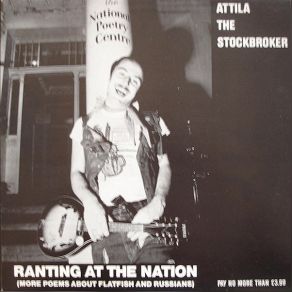Ranting At the Nation
Download links and information about Ranting At the Nation by Atilla The Stockbroker. This album was released in 1983 and it belongs to genres. It contains 28 tracks with total duration of 52:42 minutes.

|
|
|---|---|
| Artist: | Atilla The Stockbroker |
| Release date: | 1983 |
| Genre: | |
| Tracks: | 28 |
| Duration: | 52:42 |
| Buy it NOW at: | |
| Buy on iTunes $9.99 | |
Tracks
[Edit]| No. | Title | Length |
|---|---|---|
| 1. | Awayday | 3:06 |
| 2. | The Night I Slept With Seething Wells | 1:19 |
| 3. | Contributory Negligence | 1:49 |
| 4. | Nigel Wants to Go to C&A's | 1:42 |
| 5. | Albanian Football | 1:12 |
| 6. | The Perils of Stealing Half a Bottle of Wine | 1:57 |
| 7. | They Must Be Russians | 1:34 |
| 8. | Russians In the DHSS | 1:23 |
| 9. | Russians In MacDonalds | 1:37 |
| 10. | The Oracle | 1:30 |
| 11. | Death In Bromley | 1:15 |
| 12. | A Bang & a Wimpy | 1:33 |
| 13. | Nigel Wants to Go & See Depeche Mode | 1:12 |
| 14. | Russians At the Henley Regatta | 1:16 |
| 15. | Russians On the Centre Court | 2:54 |
| 16. | Fifth Column | 4:25 |
| 17. | The Fall of King Zog | 0:51 |
| 18. | Holiday In Albania | 2:13 |
| 19. | Burn It Down | 3:12 |
| 20. | England Are Back (Luxembourg Where Are You?) | 1:32 |
| 21. | Where You Goin' With That Flounder? | 1:21 |
| 22. | Hands Off Our Halibuts! | 1:23 |
| 23. | Flappin' In the Wind | 3:00 |
| 24. | Gentlemen of the Wrist | 1:37 |
| 25. | Eros Products Commercial | 2:01 |
| 26. | The Spencers Croft Cat (Dead Cat Strut) | 3:31 |
| 27. | A Very Silly East European Propaganda Station | 1:28 |
| 28. | The Fall of King Zog Reprise | 0:49 |
Details
[Edit]The first album by punk bard Attila the Stockbroker, pioneer of that peculiar style of Oi!-inflected poetry that was briefly known as ranting, also ranks among the finest contemporary comedy albums of the early '80s, a collection of running gags, skewed observations, and, face it, crippling insults that was wholly unaffected by current trends in either comedy or pop music, but lays them bare regardless. Attila's demons are manifold. Both "Flapping in the Wind" (as in "Your Raincoat, You Pratt, Is...") and "Nigel Wants to Go and See Depeche Mode" investigate the sonic cancer of new romanticism and peculiar haircuts, wherein a love of synthesizer pop was as unforgivable as an admiration for Margaret Thatcher, and not necessarily incomptable. "Death in Bromley" studies the clockwork commuter world of suburbia; "England Are Back" explores the tabloid hyperbole that surrounded the national soccer team; and "Eros Products Commercial" ponders the sort of people who derive their sexual satisfaction from rubber terrapins. Against such deliberately lighthearted diatribes can be balanced more serious concerns. The Soviet threat upon which Anglo-American relations of the time were based is explored in a series of poems that sees the Russians invading some of Britain's most cherished institutions — Centre Court at Wimbledon, the Henley Regatta, and MacDonald's among them. Recent confrontations with Iceland over fishing rights in the north Atlantic were handled by "Hands off Our Halibuts!," while "Contributory Negligence" highlights a recent court case in which a rapist was found not guilty on the grounds that his victim, by her choice of dress, was "asking for it." Other topics include left-wing politics and right-wing demagogues, juvenile crime, and Albania. But no contemplation of Attila could be considered complete without "Spencer's Croft Cat," a lament dedicated to a feline corpse that lay rotting at the end of the Stockbroker's own street. It is graphic, tasteless, and riddled with maggots. And the cat is even worse.